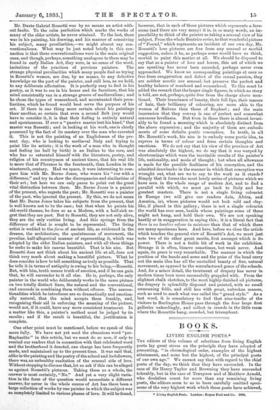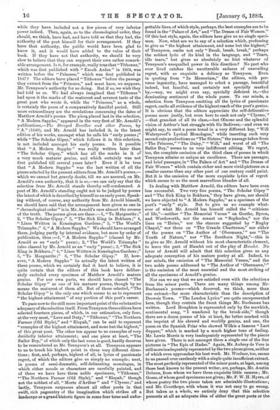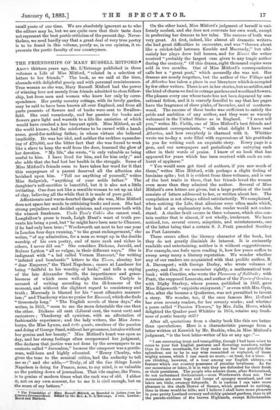BOOKS.-
LIVING ENGLISH POETS.* THE editors of this volume of selections from living English poets lay great stress on the principle they have adopted of presenting, "in chronological order, examples of the highest attainment, and none but the highest, of the principal poets of our own age." We cannot say that with regard to the chief poets of the day, we think that they have succeeded. In the case of Sir Henry Taylor and Browning they have succeeded tolerably, but in the case of Tennyson and of Matthew Arnold, who doubtless count for more than any remaining living poets, the editors seem to us to have carefully omitted sped- mens of the very highest work which these poets have achieved,
• Living English Poets. London Kogan Paul and Co. 1882. while they have included not a few pieces of very inferior power indeed. Then, again, as to the chronological order, they should, we think, have had, and have told us that they had, the authority of the poet himself for their arrangement. If they have that authority, the public would have been glad to know it, and it would have added to the value of their book. If they have not that authority, we should be very slow to believe that they can support their own rather remark- able arrangement. Is it, for example, really true that " Tithonns," which was first published with "Enoch Arden" in 1864, was written before the "Princess," which was first published in 1847? The editors have placed " Tithonus "before the passage they extract from the "Princess," and must have, we suppose, Mr. Tennyson's authority for so doing. But if so, we wish they had told us so. We had always imagined that " Tithonns " had upon it the marks of the matnrest and severest taste of the great poet who wrote it, while the "Princess," as a whole, is certainly the poem of a comparatively fanciful period. Still more extraordinary are the revelations concerning the dates of Matthew Arnold's poems. The pie% placed last in the selection, "A Modern Sappho," appeared in the very first of Mr. Arnold's publications,—The Strayed Reveller and other Poems, by "A." (1849), and Mr. Arnold has included it, in the latest edition of his works, amongst what he calls his "early poems ;" while "The Scholar Gipsy," which follows it in this selection, is not included amongst his early poems. Is it possible that "A Modern Sappho" was really written later than "The Scholar Gipsy," which has all the marks in it of a very much maturer genius, and which certainly was not first published till several years later'? Even if it be true that "A Modern Sappho" was the last written of all the pieces selected by the present editors from Mr. Arnold's poems,— which we cannot but gravely doubt, till we are assured, on Mr. Arnold's own authority, that it is so,—we can only say that the selection from Mr. Arnold stands thereby self-condemned. A poet of Mr. Arnold's standing ought not to be judged by poems the latest of which is described by himself as an early poem. Speak- ing without, of course, any authority from Mr. Arnold himself, we should have said that the arrangement here given as one in
chronological order" is in Mr. Arnold's case almost the reverse of the truth. The poems given are these :-1, "To Marguerite ;" 2, "The Scholar Gipsy ;" 3, "The Sick King in Bokhara ;" 4, Lines Written in Kensington Gardens ;" 5, "The World's Triumphs ;" 6, "A Modern Sappho." We should have arranged them, judging partly by internal evidence, but more by order of publication, thus :-1, " A Modern Sappho (classed by Mr. Arnold as an " early " poem); 2, "The World's Triumphs" (also classed by Mr. Arnold as an " early " poem); 3," The Sick King in Bokhara ;" 4, "Lines Written in Kensington Gardens ;" 5, "To Marguerite ;" 6, "The Scholar Gipsy." If, how- ever, "A Modern Sappho" be actually the latest written of these poems, which we certainly find it hard to believe, it is quite certain that the editors of this book have deliber- ately excluded every specimen of Matthew Arnold's mature genius. For our own parts, we should have classed "The Scholar Gipsy" as one of his maturer poems, though by no means the matnrest of them all. But of those selected, "The Scholar Gipsy" is the only one which seems to us to represent "the highest attainment" of any portion of this poet's career.
To pass now to the still more important point of the substantive adequacy of the selection itself. From Tennyson these editors have selected fourteen pieces, of which, in our estimation, only four, at the very most, "Love and Duty," " Tithonns," "The Northern Farmer (Old Style)," and " Rizpah," can be said to represent "examples of the highest attainment, and none but the highest," of this great poet. The other ten appear to us examples of very decidedly inferior attainment; and one piece at least, "The Sailor Boy," of which only the last verse is good, hardly deserves to be remembered as Mr. Tennyson's at all. Tennyson appears to us to touch his highest point in three very different direc- tions; first, and, perhaps, highest of all, in lyrics of passionate regret, of which the editors give us simply no example; next, in poems of semi-dramatic, self-delineating monologue, in which either moods or characters are carefully painted, and of these we have here three noble specimens, "Tithonns," " The Northern Fanner (Old Style)," and " Rizpah," though not the noblest of all, " Morte d'Arthur " and "Ulysses ;" and lastly, Tennyson surpasses almost all other poets in that swift, rich pageantry of the imagination which strikes off a landscape or a grand historic figure in some four terse and unfor- gettable lines, of which style, perhaps, the best examples are to be found in the "Palace of Art," and "The Dream of Fair Women." • Of this last style, again, the editors here give us no single speci, men. Now, what are we to say of a selection which, professing to give us "the highest attainment, and none but the highest," of Tennyson, omits not only "Break, break, break," perhaps the noblest lyric of its kind in the language, and "Tears, idle tears," but gives us absolutely no hint whatever of Tennyson's unequalled power in this direction? No poet who
ever lived catches the unutterable sadness of unavailing regret, with so exquisite a delicacy as Tennyson. Even in quoting from "In Memoriam," the editors, with per- verse ingenuity, have managed to select a passage, beautiful indeed, but fanciful, and certainly not specially marked by,—nay, we might even say, specially deficient in,—the • dominating sentiment of the whole poem. To our minds, a selection from Tennyson omitting all the lyrics of passionate regret, omits all evidence of the highest reach of the poet's genius.
It is obvious that the editors appreciate the self-delineative poems more justly, but even here to omit not only "Ulysses,'' —that grandest of all its class,—but CEnone and the splendid vision of Arthur's last struggle with Sir Bedivere,—and even we might say, to omit a poem toned in a very different key, "Will Waterproofs Lyrical Monologue," while inserting such very second-rate productions as "The Sisters," the passage taken from "The Princess," "The Daisy," "Will," and worst of all "The Sailor Boy," seems to us very indifferent editing. We regret, too, the complete omission of the third class of poems in which Tennyson attains so unique an excellence. There are passages, and brief passages, in" The Palace of Art" anti "The Dream of Fair Women" which contain richer and more vivid pictures on a smaller canvas than any other poet of our century could paint. But it is the omission of the more exquisite lyrics of regret which seems to us the most marvellous blunder of all.
In dealing with Matthew Arnold, the editors have been even less successful. Two very fine poems, "The Scholar Gipsy and "The Sick King in Bokhara," they have given, nor should we have objected to "A Modern Sappho," as a specimen of the poet's " early " style. But to give us no example what- ever of what Mr. Arnold haa himself called the "criticism of life,"—neither "The Memorial Verses" on Goethe, Byron, and Wordsworth, nor the sonnet on " Sophocles," nor the- lines on "Heine," nor the stanzas suggested by "Rugby Chapel," nor those on "The Grande Chartreuse," nor either of the poems on "The Author of ' Obermann,' " nor "The Youth of Nature," nor "The Southern Night,"—this is to give us Mr. Arnold without his most characteristic element,
to leave the part of Hamlet out of the play of Hamlet. No.
lover of Arnold will admit that this selection gives us any adequate conception of his mature poetry at all. Indeed, to.
our minds, the omission of "The Memorial Verses," and the two noble poems addressed to "The Author of Obermann,'-" is the omission of the most essential and the most striking of all the specimens of Arnold's genius.
Nor can we say that we are satisfied even with the selections from the minor poets. There are many things among Mr.- Buchanan's poems—which deserved, we think, more than one extract—far more characteristic than the description of Drowsie Town. "The London Lyrics" are quite unrepresented here, though they contain the finest things Mr. Buchanan has written. Lord Houghton is represented only by the mawkish, sentimental song, "I wandered by the brook-side," though there are a dozen poems of his at least, far better marked with the imprint of his shrewd and worldly genins, and one, the poem on the Spanish Friar who showed Wilkie a famous "Last Supper," which is marked by a much higher tone of feeling. Mr. Lewis Morris is very inadequately represented by the pieces here given. There is not amongst them a single one of the fine pictures in "The Epic of Hades." Again, Mr. Aubrey de Vere is still more inadequately represented by the two pieces given, neither of which even approaches his best work. Mr. Woolner, too, seems
to us passed over carelessly with a single quite insufficient extract.
The most perfectly represented of the minor poets, at lest, among those best known to the present writer, are, perhaps, Mr. Austin Dobson, from whom we have three exquisite little cameos ; Mr.
G-osse, of whom good specimens are given; Mr. F. W. H. Myers, of whose poetry the two pieces taken are admirable illustrations.;
and Mr. Courthope, with whom it was not easy to go wrong. But taken as a whole, we entirely deny that this selection presents at all an adequate idea of either the great poets or the
small poets of our time. We are absolutely ignorant as to who the editors may be, but we are quite sure that their taste does not represent the best poetic criticism of the present day. Never- theless, we need hardly say that a great deal of very true poetry is to be found in this volume, poorly as, in our opinion, it re- presents the poetic faculty of our countrymen.
















































 Previous page
Previous page